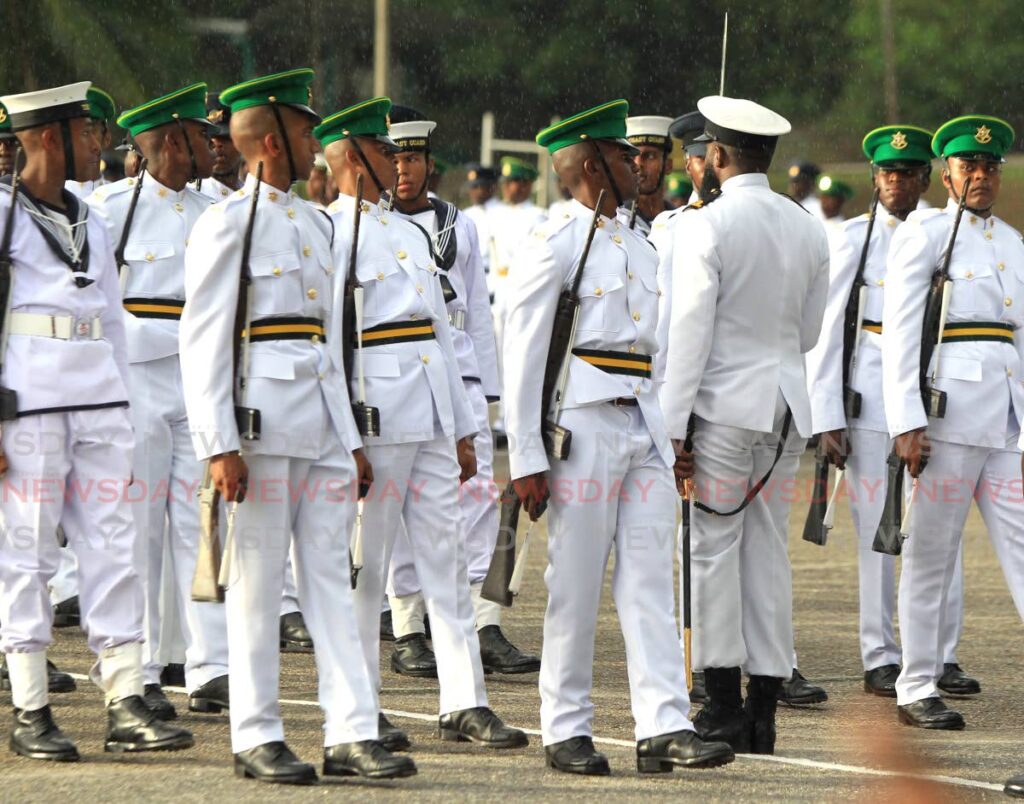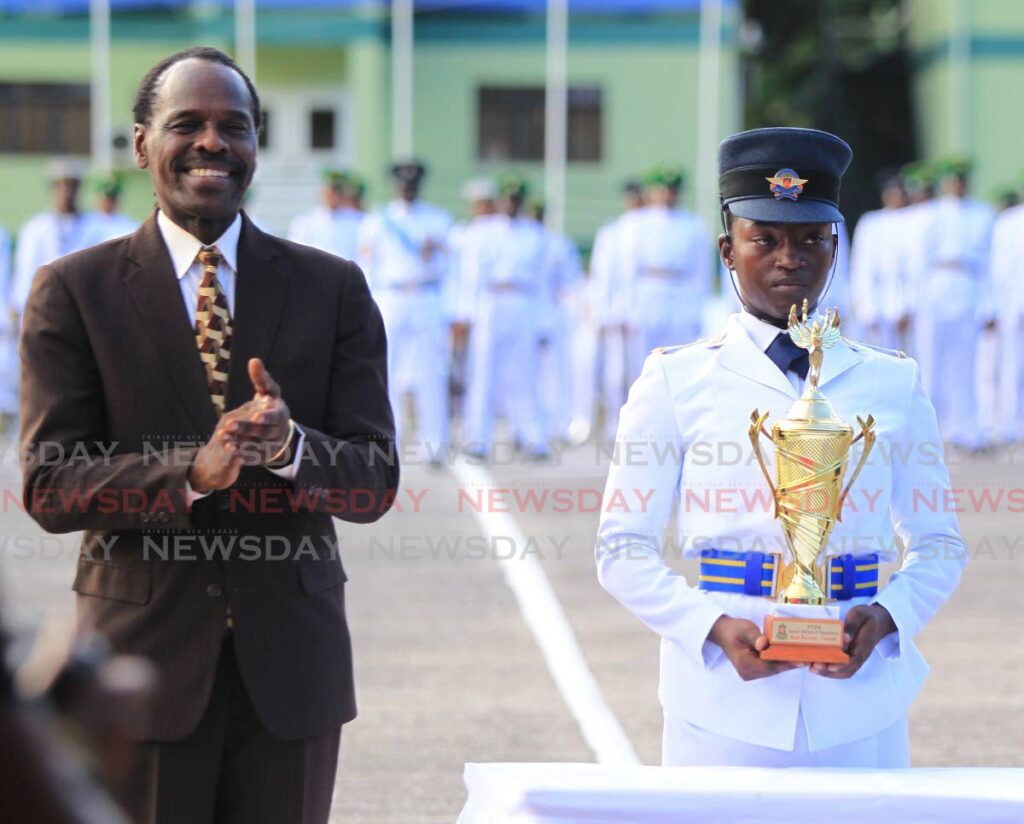Hinds: Laws coming to address rogue elements in protective, public services

IN an attempt to weed out criminal elements from within the protective services and other state agencies, National Security Minister Fitzgerald Hinds drafted legislation to conduct random “integrity testing.”
In a WhatsApp response to Sunday Newsday on Friday, Hinds said the draft legislation, which will be an amendment to the Judicial and Legal Service Act, seeks to make the random integrity testing legal.
“While at the office of the Attorney General, working alongside the legal drafters there, I drafted a policy and a bill to treat with integrity testing.
“In terms of its scope, it covers the Defence Force, police, fire service, Customs, Immigration, Board of Inland Revenue (BIR), the Registrar General’s Department and the the Financial Intelligence Unit.”
He said there are state agencies that process birth and death certificates and administer and maintain land titles. The random integrity testing will be to ensure that they remain faithful to their oaths, Hinds said.
The idea of increased accountability was first raised by Hinds at the passing-out parade of the Defence Force at Tetron Barracks, Chaguaramas on June 3. He said then that there is now a thorough and vigorous vetting process for recruiting members.
The comment came the same day a Galil rifle was discovered missing from the barracks and a $75,000 reward offered. The gun was found in some bushes off Macqueripe Road, Chaguaramas, on Friday.
Hinds said, “The event of the missing firearm, which occurred in the Defence Force is one of far too many events and incidents, which plagues the TTDF and other agencies of national security and the state sector as a whole. Too often, individuals who seek state and state sector jobs, and get them, turn around and act in ways embarrassing and harmful to the state and public interest. These acts or failure to act, makes us vulnerable. They erode public trust and confidence; and deplete state resources.”
The idea of using polygraph testing to unearth possible corrupt state officials is not novel. Former police commissioner Gary Griffith, when he was appointed in 2018, attempted to introduce random polygraph testing.
Officers who refused, threatened to sue, claiming it was illegal for them to be subjected to random lie detector testing.
Some officers were transferred out of specialised units for refusing to submit themselves to testing. A year later, Griffith remained adamant. At a media briefing he identified some questions that would have been posed to members of the Southern Division, who initially refused to be tested. The questions were: “Did you benefit financially from illegal drugs or weapons entering the country? Do you provide escort or support for the entry of illegal drugs, weapons or human trafficking?” Griffith added then that: “If someone has an issue with that, something is really wrong because I think as police officers, we will be willing to have ourselves put forward under a microscope at times because we have a very important role to play.”
Human resource specialist and former member of the Police Service Commission (PSC) Courtney Mc Nish said while polygraph testing is not 100 per cent effective as it can be manipulated, introducing it is a good idea.
“A lie detector test is not admissible in court in Trinidad and Tobago. Yes, it can be fooled but it possesses a good indicator of whether or not someone is being truthful.”
Mc Nish said there is no constitutional right for anyone to tell untruths and questioned what possible objection one might have to the test, adding that refusals may infer that the person has something to hide. He said despite the shortcomings of the test, there is nothing wrong with using it.
“There is an obligation of full disclosure in the recruitment process and lie detector tests merely expand on that.”
President of the Public Servants Association (PSA) Leroy Baptiste said he could not comment on the proposed legislation as he had not seen it.
He said, though, the government has “steadfastly acted not in the best interest of workers” and believe the proposal will be a continuation of that.

President of the Police Social and Welfare Association Insp Gideon Dickson questioned if the intended legislation will affect all sectors of state agencies, inclusive of the Judiciary and Parliament. He said if that is the direction that society wants to go, after consultation, then the association will accept it.
“The association is all for a better TT and we are not adverse to technology but we are mindful that polygraph testing is not an accurate science. There is a need for wider research and consultation on this and we can not carbon copy what other countries are doing.”
Former chief of defence staff retired Major General Kenrick Maharaj also believes the time has come for the recruitment process of the Defence Force to change so it can better weed out rogue elements.
Sunday Newsday spoke with Maharaj on Tuesday on Hinds’ statements of strengthening the recruitment process. Maharaj was the recruiting officer for the Defence Force from 1995 to 1997 and was chief of defence staff between 2011 and 2015.
Maharaj said the weeding out process should not be limited to recruitment but extend to the probationary period after a member has completed the four months training. The length of the training, he said, should also be extended to six months. He said there should be an increase in the manpower to allow for a proper vetting of candidates with a continual assessing of members.
“When I was a recruitment officer and when I was doing my training, there was no such thing as interviewing the recruits. There was an interview pre-enlistment but ongoing interviews will really enforce whether some persons are really on the good side of the law or whether they are questionable.”
Maharaj said one of the things he hopes to see is an increased training of the laws of the country. He said with a highly litigious society it is imperative now, more than ever, for members of the Defence Force to have a better understanding of the laws.
“There are several aspects to the life of the organisation now that require a serious look at the current Defence Force Act. (Lt) Colonel (Sheldon) Ramnanan, who is the inspector general of the Defence Force and legal officer, understands all too well the critical need for a revision of the Defence Force Act.”
In a WhatsApp interview, Griffith, who is also a former soldier and national security minister, said while changing the recruitment process is good, it is only when members are confirmed in the Defence Force and see how easily they can earn money illegally are they inclined to engage in criminal behaviour.
Without knowing of Hinds’ plans, he suggested legislative reform where the National Security Minister and Chief Justice Ivor Archie should discuss “suppressing” the rights of members of the Defence Force.
“What the Minister can do is liaise with the Chief Justice and look at the best practice worldwide, that there are certain things, rights, that a soldier/sailor should not and would not have that the average citizen has.”
Griffith said there are members of the Defence Force who are “quick to go to court” when measures are in place to possibly weed out criminal elements. He added that currently the law allows members of the Defence Force to have the same rights as citizens and that should not be. Once there was a policy of “comply and then complain,” there are those now challenging decrees of the Defence Force in court.
“Now people are taking the Defence Force to court for every trivial matter. Because of that it makes it very difficult for the Defence Force. We need to have some serious conversations with our justice system to explain that being a soldier, there are a lot of your rights that must be removed that cannot be equated to someone working in a bank.”
Griffith said he was not advocating for the abuse and persecution of members of the Defence Force members but they should understand that they are not like any other entity and must subject themselves to higher level of scrutiny, which some may consider a violation of their rights.
He said the Defence Force was now “civillianised” to the point where rogue elements think they have “rights and things similar to normal citizen.” This he said has “practically unionised” the Defence Force.
In April, Hinds said he insisted that a more thorough check be made before accepting recruits into the protective services. He said recruiters should visit the past schools, their communities and not only rely on certificates of good character from police.
“These are the kinds of things we ensure that is done to ensure we get a better product,” he said.

Comments
"Hinds: Laws coming to address rogue elements in protective, public services"